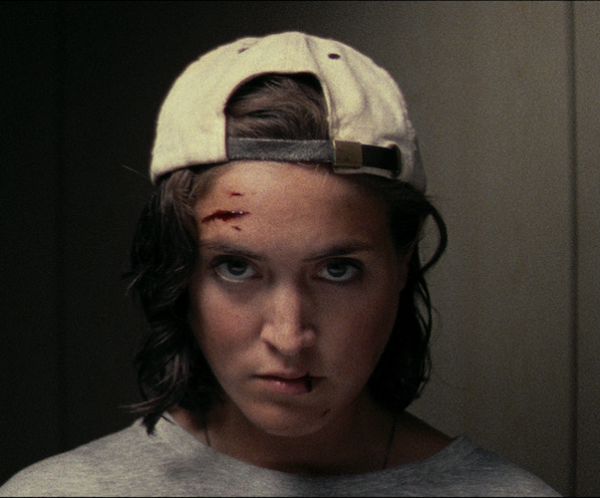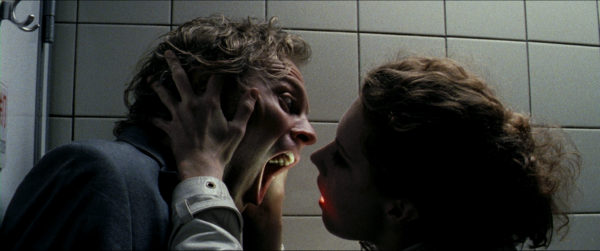Film Review: “Luz” — Strangely Compelling Retro Horror
By Peg Aloi
A genre debut as self-assured as Luz is always exciting.
Luz directed by Tilman Singer. Screening at Coolidge Corner Theatre tonight at midnight.

Luana Veliz in a scene from “Luz.”
Sometimes horror’s impact is driven by sensation rather than story. Thinking about some of the most chilling films in the genre I have seen over the years, it is often style, not plot points, that create the most memorable suspenseful or frightening experiences. Consider Argento’s Suspiria without its garish color scheme or the ethereal, insistent score by Goblin. Consider Polanski’s Rosemary’s Baby without its subtle cinematography and naughty humor. Consider the foreboding shots of the forest in The Witch; the shadowy, skulking, chalk-white grinning faces in Hereditary; the cold lighting and matter-of-fact performances in Goodnight, Mommy. Or consider the low-budget gonzo masterpiece The Blair Witch Project, devoid of music and of what could be called cinematography. Sometimes, less is more, and when it comes to horror, minimalism can be a strangely effective tool in a visionary’s filmmaker’s toolkit.
I’m not a fan of a recent trend in horror cinema, what I call the “I Can’t Be Bothered” School. These auteurs tend to think that doing away with a coherent plot reflects an admirable desire to avoid “overexplaining,” with its risk of becoming mired in context or exposition. But sometimes viewers need those things. Horror fans are asked to suspend disbelief in so many ways: to accept a supernatural, or at least preternaturally-enhanced, version of reality. I may not need a lot of narrative set-up in order to buy into what’s happening, but I need a soupçon of why, a smidgen of how, a dusting of dramatic backstory. That, or the characters and mise en scene need to knock my skeptical socks off.
Luz, the debut feature from German filmmaker Tilman Singer, is minimalistic, and somewhat devoid of narrative context. But it has a spare, mysterious vibe that keeps the viewer guessing. Shot on 16mm film, the movie proffers a dreamy, grainy look, and it features one of the most compelling scores I’ve heard in a while. The story is a bit disjointed, jumping through time and place. The opening scene features Luz (Luana Veliz in a subtle, striking performance), a young cabdriver in Chile, entering a police station. She is thin, with a gamine, tomboyish look, in baggy clothes and a backwards ball cap. The background score (composed by Simon Waskow) builds slowly, tinkling piano and strings, electronic and melodic. Luz shuffles listlessly, buys a soda from the machine, guzzles it down, then stands waiting for the receptionist to notice her. She screams at him: “Is this what you wanted your life to be?” This line of dialogue repeats throughout the film, and it’s tempting to think we’re being asked by the filmmaker to re-evaluate our expectations of genre cinema — or, perhaps, of ourselves.

A scene from “Luz.”
This opening cuts abruptly to a scene in which a young German psychotherapist (Jan Bluthardt), drinking in a bar, reacts to his pager when it goes off. The pager, and the lack of smartphones, tell us we’re in the not too distant past. He hears a woman ask, “Are you a doctor?” He looks around, confused to see no one else in the room but the bartender. Then the questioner suddenly appears; Nora, a young German woman in a leather jacket (Julia Riedler). She questions him, her head tilted suggestively in his direction. Once she learns his field is psychology, she mentions her girlfriend, who jumped out of a moving car, who “could use a therapist.” The doctor is somewhat standoffish at first, but Nora moves closer and orders elaborate cocktails for them, strangely colored potions that require shaking, served with speared bits of celery and fruit. These physical details anchor to reality an odd and surreal conversation. Nora snorts cocaine openly, and the two drink copiously as she describes her girlfriend Luz, who she first met in a catholic girls’ school. She talks about the demon that has possessed Luz, and how its presence has affected her own life. Nora’s story has hints of witchcraft and the paranormal: the doctor is intrigued. The fairly nondescript bar setting shifts abruptly to a misty chamber where much of the rest of the drama plays out. Indeed, the film’s settings match the number of languages spoken in the film (Spanish, German, and English), but an inventive use of space and time keeps the visuals and pacing lively.
There are other players (like the female officer and her assistant who interrogate Luz), but the nameless doctor and the mysterious Nora are at the center of an intense session of hypnotic regression therapy (more evidence that the story takes place several decades ago) during which Luz is conjured and questioned. The dramatic action is compelling, with the actors pantomiming most of the action, though there are occasional bursts of cinematic verisimilitude. This mix of film and theater is unusual — and oddly watchable. It sets up a framework whereby viewers gradually feel unsure of what is real. Is this a fragment of memory or a willful delusion? The experience of possession is explored through an examination of identity, both physical and psychological. I confess I didn’t always understand precisely what was happening, but my attention never wandered, given the creepy visuals, hypnotic music, and intense performances. A genre debut this self-assured is always exciting: Singer’s savvy style, influenced by giallo masters Argento and Fulci, as well as by other iconic horror masters such as Lynch, Cronenberg, and Shyamalan, suggests a bold new talent to watch.
Peg Aloi is a former film critic for The Boston Phoenix. She taught film studies in Boston for over a decade. She writes regularly for The Orlando Weekly, Crooked Marquee, and Bloody Disgusting. Her blog “The Witching Hour” can be found at at themediawitch.com.

